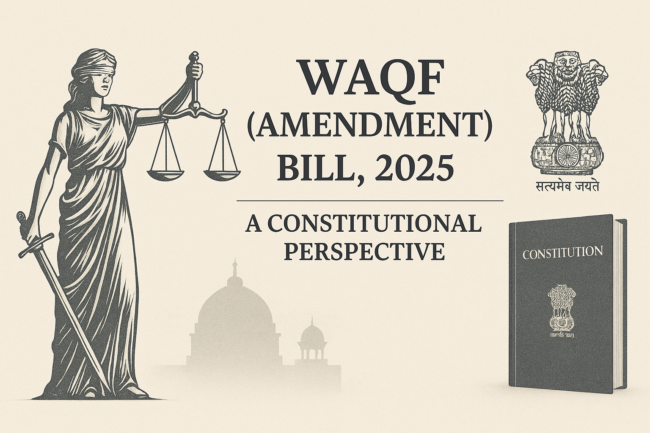🧱 Introduction
The Waqf (Amendment) Bill, 2025, passed by the Lok Sabha on April 3, 2025, aims to reform the governance and management of Waqf properties in India. The Bill introduces significant provisions intended to promote transparency, accountability, and legal clarity. However, it has drawn scrutiny regarding its potential to infringe upon fundamental rights, particularly those related to religious freedom, minority protections, and property rights.
This article presents a legal and constitutional analysis of the Bill in light of the Fundamental Rights enshrined in Part III of the Constitution, judicial interpretations, and established doctrines of constitutional law.
⚖️ Article 14 – Equality Before Law
Legal Principle: Article 14 ensures equality before the law and equal protection of the laws. A legislative classification must be based on an intelligible differentia and must have a rational nexus to the object sought to be achieved (State of West Bengal v. Anwar Ali Sarkar, 1952).
Bill Provisions Analyzed:
- Section 3A: Restricts Waqf creation to lawful owners.
- Section 3C: Bars Waqf claims on government properties.
- Section 3B: Mandates a centralized digital portal for registration and record-keeping.
Legal Assessment: These provisions introduce rational administrative controls to prevent arbitrary or illegal Waqf declarations. The objective is to ensure that only legitimate waqf property is recognized under law, preserving the rights of current title holders and preventing fraudulent claims over state and private lands.
The classification made by the Bill is reasonable as it clearly distinguishes between lawful and unlawful dedications. Furthermore, digitization enhances accessibility and reduces ambiguity in property records, which is essential for legal certainty and administrative efficiency.
Conclusion: Constitutionally valid under Article 14.
🏛️ Articles 25 & 26 – Religious Freedom and Denominational Rights
Legal Principle: Articles 25 and 26 protect religious freedoms but permit the State to regulate secular aspects associated with religious practice (Shirur Mutt Case, 1954; Ismail Faruqui v. Union of India, 1994).
Bill Provisions Analyzed:
- Requirement of ownership for Waqf creation (Sec. 3A).
- Transfer of survey powers to the Collector.
- Inclusion of women, backward sects, and non-Muslims in Waqf Boards.
- Prohibition of Waqf declarations over protected monuments and tribal lands.
Legal Assessment: The Bill’s provisions primarily pertain to the secular administration of waqf property. According to the Supreme Court, essential religious practices are protected under Article 25, but administrative aspects such as financial audits, surveys, and appointment of officials are not.
For instance, in Shirur Mutt, the Court recognized that management of religious institutions falls within the regulatory powers of the State. The inclusion of diverse stakeholders in the governance of waqf boards may appear novel, but it aligns with the principle of inclusive secular administration. Representation of women and backward classes further strengthens the democratic and egalitarian ethos of governance under Article 15(3) and Article 16(4).
Conclusion: The Bill regulates secular aspects of Waqf governance. It does not restrict or interfere with religious beliefs or rituals. Therefore, it does not infringe Articles 25 or 26.
🧓♂️ Article 29 – Cultural and Minority Rights
Legal Principle: Article 29 protects the right to conserve cultural identity and prevents discrimination in state-supported educational institutions.
Bill Provisions Analyzed:
- Representation of marginalized Muslim communities.
- Measures to support women, widows, and orphans through Waqf income.
Legal Assessment: The Waqf system has historically played a vital role in supporting educational and charitable functions within the Muslim community. By restructuring its governance and expanding representation to historically excluded sub-groups, the Bill advances substantive equality. The aim is not to dilute religious character but to strengthen the functioning of waqf institutions in line with contemporary constitutional values.
Importantly, there is no interference with language, script, or religious practices. Therefore, Article 29 rights remain intact.
Conclusion: Consistent with Article 29.
🏠 Article 300A – Right to Property
Legal Principle: Article 300A guarantees that no person shall be deprived of property except by authority of law (K.T. Plantation Pvt. Ltd. v. State of Karnataka, 2011).
Bill Provisions Analyzed:
- Ownership requirement for Waqf creation (Sec. 3A).
- Bar on Waqf claims over government, tribal, and archaeological land (Secs. 3C, 3D, 3E).
Legal Assessment: There have been instances where private and government lands were claimed as waqf without clear documentation, leading to protracted litigation and administrative hurdles. The provisions in the Bill impose necessary procedural constraints to ensure that no property is misclassified.
The prohibition on declaring government and protected lands as waqf protects public assets and ensures that state development projects and conservation efforts are not disrupted. The requirement of lawful ownership before a waqf can be created reaffirms the principle that property cannot be encumbered without due legal process.
Conclusion: Enhances property protection; constitutionally sound.
📂 Additional Constitutional Observations
- Judicial Review Restored: By removing finality clauses, the Bill reopens the scope for writ jurisdiction under Articles 226 and 32. This aligns with the Basic Structure Doctrine, reaffirming the independence of the judiciary and accessibility to constitutional remedies.
- Application of Limitation Act (Sec. 107): The express inclusion of limitation periods addresses historical ambiguities and prevents misuse through indefinite claims. This bolsters legal certainty and efficient dispute resolution.
- Mutawalli Disqualifications (Sec. 50A): Introducing qualifications and ethical standards for mutawallis professionalizes Waqf administration and ensures that those in fiduciary roles act in accordance with constitutional values of integrity and public accountability.
📘 Conclusion
The Waqf (Amendment) Bill, 2025, upon legal scrutiny, does not violate any fundamental rights. Instead, it upholds constitutional mandates of transparency, secular administration, and protection of lawful property rights. It advances good governance, promotes social equity, and reinforces constitutional morality.
The Bill rightly distinguishes between matters of religion and secular administration and falls within the ambit of permissible regulation. It should be viewed as a progressive legislative intervention that balances community interests with constitutional compliance.
About the Author
Adv. M K Soni is an advocate and legal policy commentator. He is the founder of TheKnowledgeNexus.com, dedicated to simplifying legal reforms and constitutional developments for legal professionals, students, and informed citizens.


